(人教版)高中英语必修二学案:Unit 4 Learning about Language (含答案)
人教版(2019)新教材高中英语必修第二册第四单元词汇学案
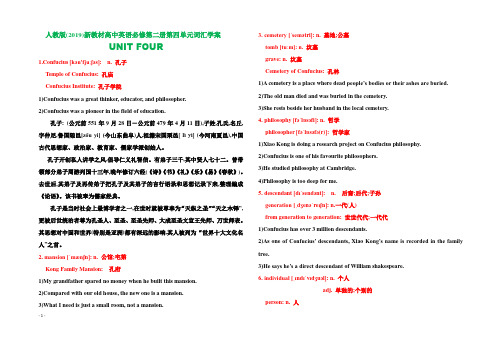
人教版(2019)新教材高中英语必修第二册第四单元词汇学案UNIT FOUR1.Confucius [kən'fjuːʃəs]: n. 孔子Temple of Confucius: 孔庙Confucius Institute: 孔子学院1)Confucius was a great thinker, educator, and philosopher.2)Confucius was a pioneer in the field of education.孔子: (公元前551年9月28日-公元前479年4月11日),子姓,孔氏,名丘,字仲尼,鲁国陬邑[zōu yì] (今山东曲阜)人,祖籍宋国栗邑[ lìyì] (今河南夏邑),中国古代思想家、政治家、教育家、儒家学派创始人。
孔子开创私人讲学之风,倡导仁义礼智信。
有弟子三千,其中贤人七十二。
曾带领部分弟子周游列国十三年,晚年修订六经(《诗》《书》《礼》《乐》《易》《春秋》)。
去世后,其弟子及再传弟子把孔子及其弟子的言行语录和思想记录下来,整理编成《论语》。
该书被奉为儒家经典。
孔子是当时社会上最博学者之一,在世时就被尊奉为“天纵之圣”“天之木铎”,更被后世统治者尊为孔圣人、至圣、至圣先师、大成至圣文宣王先师、万世师表。
其思想对中国和世界(特别是亚洲)都有深远的影响,其人被列为“世界十大文化名人”之首。
2. mansion [ˈmænʃn]: n. 公馆;宅第Kong Family Mansion: 孔府1)My grandfather spared no money when he built this mansion.2)Compared with our old house, the new one is a mansion.3)What I need is just a small room, not a mansion. 3. cemetery [ˈsemətri]: n. 墓地;公墓tomb [tuːm]: n. 坟墓grave: n. 坟墓Cemetery of Confucius: 孔林1)A cemetery is a place where dead people’s bodies or their ashes are buried.2)The old man died and was buried in the cemetery.3)She rests beside her husband in the local cemetery.4. philosophy [fəˈlɒsəfi]: n. 哲学philosopher [fəˈlɒsəfə(r)]: 哲学家1)Xiao Kong is doing a research project on Confucius philosophy.2)Confucius is one of his favourite philosophers.3)He studied philosophy at Cambridge.4)Philosophy is too deep for me.5. descendant [dɪˈsendənt]: n. 后裔;后代;子孙generation [ˌdʒenəˈreɪʃn]: n.一代(人)from generation to generation: 世世代代;一代代1)Confucius has over 3 million descendants.2)As one of Confucius’ descendants, Xiao Kong’s name is recorded in the family tree.3)He says he’s a direct descendant of William shakespeare.6. individual [ˌɪndɪˈvɪdʒuəl]: n. 个人adj. 单独的;个别的person: n. 人- 1 -people: n. 人; 民族1)An idiom is an expression which means something different from the meaning ofthe individual words.2)Sometimes I feel that individuals can have little effect on such hugeenvironmental problems.3)The museum is open to both teams and individuals.7. heel [hiːl]: n. 足跟; (脚/袜子/鞋等的)后跟Achilles’ [əˈkili:z] heel: (喻)(希腊神话)阿喀琉斯的脚跟; 致命的弱点1)English is his Achilles’ heel.2)Lucy’s Achilles’ heel is that she cannot believe in others.3)She will buy shoes with a low/high heel.阿喀琉斯的脚跟/之踵[zhǒng]阿喀琉斯, 是凡人英雄珀琉斯和海洋女神忒[tè]提斯的爱子。
2020-2021学年 高中英语 人教版(2019)必修二 Unit4.学案
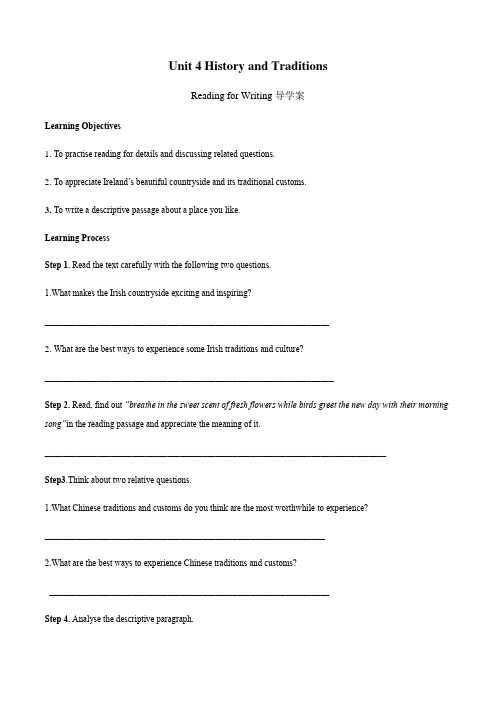
Unit 4 History and TraditionsReading for Writing导学案Learning Objectives1.To practise reading for details and discussing related questions.2.To appreciate Ireland’s beautiful countryside and its traditional customs.3.To write a descriptive passage about a place you like.Learning ProcessStep 1. Read the text carefully with the following two questions.1.What makes the Irish countryside exciting and inspiring?_________________________________________________________________2.What are the best ways to experience some Irish traditions and culture?__________________________________________________________________Step 2. Read, find out “breathe in the sweet scent of fresh flowers while birds greet the new day with their morning song”in the reading passage and appreciate the meaning of it.______________________________________________________________________________Step3.Think about two relative questions.1.What Chinese traditions and customs do you think are the most worthwhile to experience?________________________________________________________________2.What are the best ways to experience Chinese traditions and customs?________________________________________________________________Step 4. Analyse the descriptive paragraph.Structure:the introductory sentence:___________________________________________________________________________________the ending sentence:____________________________________________________________________________________ Vocabulary:1.Its beautiful countryside excites and inspires all, ____________________(提供了一些东西) each of the senses.2.The peaceful landscape of the “Emerald Isle” and its many green counties is a true feast for the eyes,________________________________________(青山连绵起伏,牛羊点缀其中).3.With all this beauty, ________________________(毫不令人惊讶的是) Ireland has developed strong traditions that include music, dancing, and dining.4. And if you introduce yourself to a friendly face, you are______________________________________________ (很有可能会体验到当地的文化和风俗)first-hand.Sensory detailsStep5. Work in pairs. Choose your favorite place that is interesting, exiting or surprising and then try to describe itto you partner in the following perspectives.✓What can you see?✓What can you hear?✓How does the place feel?✓What can you smell?✓What can you taste there?✓What does the place make you think or feel?e your answers to draft a passage about the place.Introduction Make the reader eager to read your writingA striking imageSomething surprisingA quote or questionIn my village, every day startsWith a “fire ”! The houses turnred as the sun rises above themountains.Body TransitionsHelp the reader follow your ideasIn the morning/afternoon/eveningFirst, second, etc.In the north .. In the east ..Details and examplesUse sensory detailsDo not use general wordsGive examplesWhat can you see, hear, smell, etc.?I learnt a lot.→What did you learn?There were many things... →What?Some people...→Who?Ending Let the reader know that the passage endsHelp the reader remember your writingAt night, the stars come out to tellus that all is well and my villagegrows quiet. For now we’ll sleep,and tomorrow the sun will set uson fire again for a new day!【答案】Step1.1.Its beauty and how it offers something for all the senses.2.By stopping by a village pub and relaxing with a drink and traditional meal while listening to music and watching dancing. OR By exploring all different parts of the country and experiencing what he country gives to all the senses.Step 2.1.It means to not just smell but also breathe in the smell of fresh flowers early in the morning as the birds sing their first song of the new day.Step 3.1.Answers may vary.2.By traveling to different places and using all your senses to experience everything and by interacting with local people.Step4.Structurethe introductory sentence: Ireland’s beautiful countryside has always had a great influence on its people and traditions.the ending sentence: If you introduce yourself to a friendly face, you are likely to experience the local culture and customs first-hand .Vocabulary1.offering something for2.with its rolling green hills dotted with sheep and cattle3.It is not surprising that4.more than likely to experience local culture and customsSensory detailsStep6 Sample WritingIn my village, every day starts with a“fire”! The houses turn red as the sun rises above the mountains,Seeing the flames, the roosters sound the alarm. They wake everyone in the village with their loud cries, chasing the children to school and rushing the adults to work. In the evening, a gold haze settles over everything. This is my favourite time of the day, when all work for the day has been completed. When the smell of hot oil and fragrant spices float through the air, I know that it will soon be time for dinner. My neighbors begin to call to their children to come home. The birds begin their nightly quarrel over their favourite places to rest.At night, the stars come out to tell us that all is well and my village grows quiet. For now we’ll sleep, and tomorrow the sun will set us on fire again for a new day!。
高中人教版英语必修2unit 4 教案
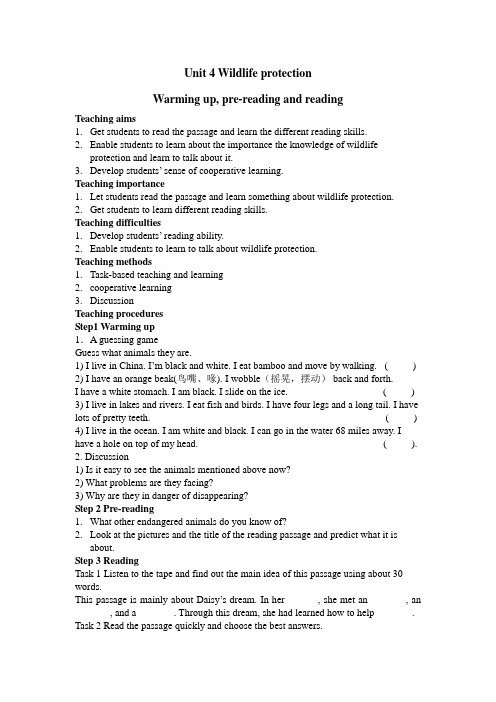
Unit 4 Wildlife protectionWarming up, pre-reading and readingTeaching aims1.Get students to read the passage and learn the different reading skills.2.Enable students to learn about the importance the knowledge of wildlifeprotection and learn to talk about it.3.Develop students’ sense of cooperative learning.Teaching importance1.Let students read the passage and learn something about wildlife protection.2.Get students to learn different reading skills.Teaching difficulties1.Develop students’ reading ability.2.Enable students to learn to talk about wildlife protection.Teaching methods1.Task-based teaching and learning2.cooperative learning3.DiscussionTeaching proceduresStep1 W arming up1.A guessing gameGuess what animals they are.1) I live in China. I’m black and white. I eat bamboo and move by walking. ( )2) I have an orange beak(鸟嘴、喙). I wobble(摇晃,摆动) back and forth.I have a white stomach. I am black. I slide on the ice. ( )3) I live in lakes and rivers. I eat fish and birds. I have four legs and a long tail. I have lots of pretty teeth. ( ) 4) I live in the ocean. I am white and black. I can go in the water 68 miles away. I have a hole on top of my head. ( ).2. Discussion1) Is it easy to see the animals mentioned above now?2) What problems are they facing?3) Why are they in danger of disappearing?Step 2 Pre-reading1.What other endangered animals do you know of?2.Look at the pictures and the title of the reading passage and predict what it isabout.Step 3 ReadingTask 1 Listen to the tape and find out the main idea of this passage using about 30 words.This passage is mainly about Daisy’s dream. In her ______, she met an _______, an _______, and a _______. Through this dream, she had learned how to help _______. Task 2 Read the passage quickly and choose the best answers.1. Why did elephants use to be an endangered species in Zimbabwe?A. Tourists hunted too many elephants.B. Farmers hunted them without mercy.C. The government encouraged farmers to hunt them.D. Their living environment was seriously polluted.2. What can be inferred from the elephant’s words, “Have you come to take my photo”?A. It thinks itself a beautiful animal.B. Elephants are friendly to human beings.C. Money from tourists went to the large tour companies.D. Now many more tourists come to take its photos rather than hunt it.3. The sentence “No rain forest, no animals and no drugs” means _________A. There was no drug in the rain forestB. Animals i n the rain forest didn’t need drugsC. Rain forest, animals and drugs were resulted in and from each otherD. Drugs were important for animals and the rain forest4. What did Daisy learn from her experience?A. Some animals were becoming endangered as a re sult of humans’ hunting.B. Wildlife should be helped and protected by us humans.C. Humans and wildlife can benefit each other in many ways.D. All of the above.Task 3 Read the passage carefully paragraph by paragraph and fill in the blanks.What can we do to help the endangered animals?Step 4 Homework1.Try to retell the story2.Preview the useful words and expressions in this passage.。
(人教版)必修二 优秀教案 (Unit4 Wildlife protection--Period2 Learning about Language)
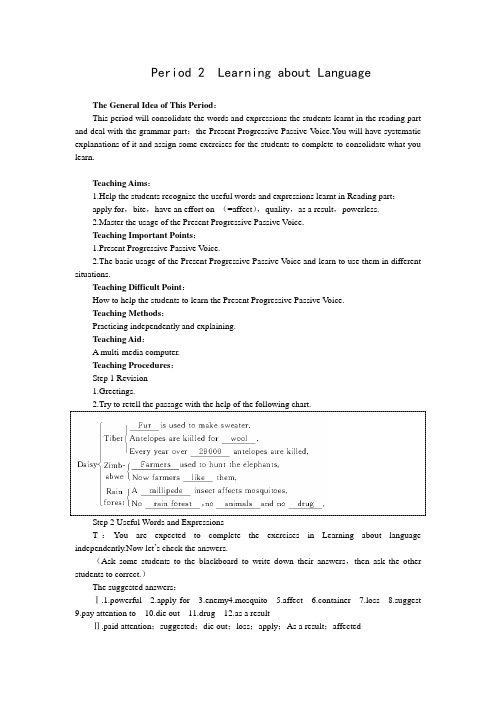
Period 2 Learning about LanguageThe General Idea of This Period:This period will consolidate the words and expressions the students learnt in the reading part and deal with the grammar part:the Present Progressive Passive V oice.You will have systematic explanations of it and assign some exercises for the students to complete to consolidate what you learn.Teaching Aims:1.Help the students recognize the useful words and expressions learnt in Reading part:apply for,bite,have an effort on (=affect),quality,as a result,powerless.2.Master the usage of the Present Progressive Passive Voice.Teaching Important Points:1.Present Progressive Passive V oice.2.The basic usage of the Present Progressive Passive V oice and learn to use them in different situations.Teaching Difficult Point:How to help the students to learn the Present Progressive Passive V oice.Teaching Methods:Practicing independently and explaining.Teaching Aid:A multi-media computer.Teaching Procedures:Step 1 Revision1.Greetings.2.Try to retell the passage with the help of the following chart.Step 2 Useful Words and ExpressionsT:You are expected to complete the exercises in Learning about language independently.Now let’s check the answers.(Ask some students to the blackboard to write down their answers,then ask the other students to correct.)The suggested answers:Ⅰ.1.powerful 2.apply for 3.enemy4.mosquito 5.affect 6.container 7.loss 8.suggest 9.pay attention to 10.die out 11.drug 12.as a resultⅡ.paid attention;suggested;die out;loss;apply;As a result;affectedⅢ.1.after all 2.endanger 3.affect 4.powerful 5.because 6.because ofStep 3 Useful StructuresT:This part is about the Present progressive Passive Voice:am/is/are being done.At first,who can find out two more examples?S1:Daisy is being watched by an excited elephant.S2:The elephant is being protected by the farmers.T:Very good.Now let’s check the answers in Exercise 2 on Page 29.(Ask some students to write the answers on the blackboard first.Then check it.)Step 4 Exercises on WBT:In this unit we have learnt some useful words,expressions and structures,now let’s do exercises about them.Check the answers of Ex.1 on Page 63,Ex.3 on Page 64 and Ex.1 of Using structures.The suggested answers:Ex.1:1.help 2.rise 3.protect 4.affect 5.suggest 6.concerned 7.attention 8.wildlife 9.rainforest 10.endangerEx.3:World Wildlife,set,international,organization,projects,protecting,endangered,consider,led,save,reserves,signEx.1 of Using structures:1....is under repair=...is being repaired2....is under discussion=...is being discussed3....are under research=...are being researched4....is under consideration=...is being considered5....is under development=...is being developedT:Now let’s do some more exercises of the workbook.Please turn to Page 64,I’ll give you five minutes to translate the sentences and answer the questions of Exercise 2.(Five minutes later.)T:Please change your answers with your partner,and try your best to correct the sentences,then practice the questions in pairs.(One asks,the other one answers.)The possible answers:S1:What can we do to protect Milu deer from disappearing again?Partner:We should protect their living conditions and forbid hunters to kill them freely.S2:Do you think the pandas in China are in danger?Partner:Of course.They have less and less food to eat,they are being hunted and their livingconditions are being destroyed,too.S3:What are your suggestions about protecting wildlife?Partner:We should protect their living conditions,forbid hunters to kill them freely,build more natural reserves for them and we shouldn’t disturb them.S4:Do you know why the dinosaurs suddenly died out about 65000000 years ago?Partner:I’m not so sure about it.Maybe there were disasters on the earth.S5:The national wildlife protection parks shouldn’t be open to the tourists.Do you think so?Partner:Yes.I agree.Step 5 HomeworkT:That’s all for this class,after class I hope you’ll review what we’ve learned.Step 6 The Design of the Writing on the BlackboardUnit 4 Wildlife protectionPeriod 21.bite vt./vi.(bit,—bitten)咬;叮;刺痛2.have an (good/bad/no)effect on...=affect 对……有影响3.pay attention to “to”is a prep.here.,after “to”we should use nouns or v-ing.Step 6 Record after Teaching。
人教高中英语必修2Unit4 Learning about Language 课件
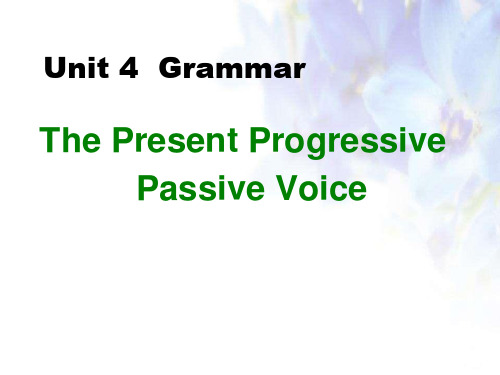
The Present Progressive Passive Voice
Objective
To learn and use the present progressive passive voice.
Revision of the Passive Voice
1.Every year many elephants _a_r_e_k_i_ll_e_d__(kill) in Thailand. 2. Our classroom _i_s_c_le_a_n_e_d__(clean) by us every day. 3. In the past, the antelopes _w_e_r_e_k_il_l_ed__(kill) by famers. 4. He _w_a_s__b_it_te_n_(bit) by a dog yesterday.
用法
表示说话人说话时或现阶段正在进行的 动作,经常和时间副词now (现在), right now (现在, 此刻), at present (现在, 目前), at this moment (此刻) 连用。
意义
1.主语和谓语动词之间是被动关系, 2.而且动作正在进行。 (1). Music is being taught by Miss Li now. (2). New functions are being added to the
phone at present.
They are building nine parks.
主语 谓语
宾语
Nine parks are being built by them.
主语
谓语
宾语
Nine parks are not being built by them.
人教版高中英语必修二unit4学习教案

人教版高中英语必修二unit4学习教案一、教学内容二、教学目标1. 学生能够理解并掌握阅读材料中的生词和短语,如:oxygen, generate, climax等。
2. 学生能够运用一般现在时和一般过去时描述云的形成过程及特点。
3. 学生能够运用所学知识,进行有关天气和自然现象的讨论。
三、教学难点与重点1. 教学难点:一般现在时和一般过去时的运用,以及使用“It”作为形式主语的句子结构。
2. 教学重点:云的形成过程、特点以及与之相关的词汇和表达。
四、教具与学具准备1. 教师准备:PPT、黑板、粉笔、阅读材料。
2. 学生准备:课本、笔记本、字典。
五、教学过程1. 导入:通过展示一组有关天气和云的照片,引导学生讨论天气和云的特点。
2. 阅读与思考:学生阅读“A Day in the Clouds”一文,并完成相关练习,教师进行讲解。
3. 例题讲解:讲解一般现在时和一般过去时的运用,以及使用“It”作为形式主语的句子结构。
4. 随堂练习:学生完成Discovering Useful Structures部分的相关练习,教师进行点评。
5. 小组讨论:学生分组讨论,运用所学知识描述云的形成过程及特点。
六、板书设计1. Unit 4 A Day in the Clouds2. 词汇:oxygen, generate, climax等3. 句子结构:一般现在时、一般过去时,使用“It”作为形式主语七、作业设计1. 作业题目:根据课堂所学,写一篇关于云的形成过程及特点的短文。
2. 答案要求:使用一般现在时和一般过去时,不少于100词。
八、课后反思及拓展延伸1. 教师反思:关注学生在课堂上的参与程度,调整教学方法和节奏,以提高教学效果。
2. 拓展延伸:鼓励学生关注天气变化,观察云的形态,提高英语实际应用能力。
重点和难点解析1. 教学难点:一般现在时和一般过去时的运用,以及使用“It”作为形式主语的句子结构。
2. 例题讲解:讲解一般现在时和一般过去时的运用,以及使用“It”作为形式主语的句子结构。
【教案】Unit 4 Learning about Language 人教版选择性必修第二册)
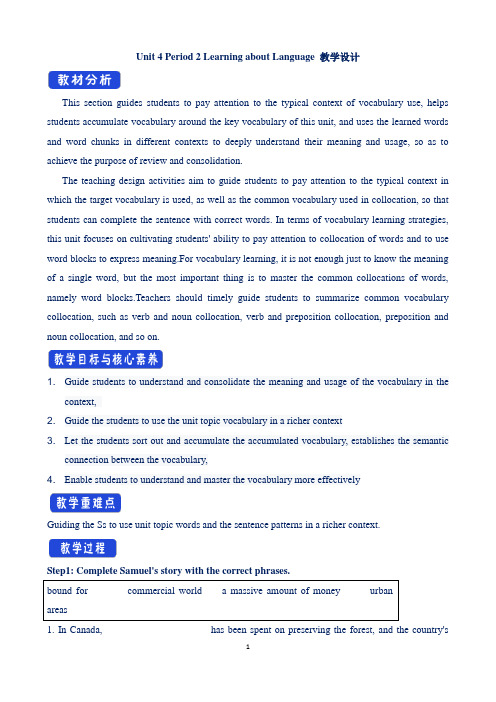
Unit 4 Period 2 Learning about Language 教学设计This section guides students to pay attention to the typical context of vocabulary use, helps students accumulate vocabulary around the key vocabulary of this unit, and uses the learned words and word chunks in different contexts to deeply understand their meaning and usage, so as to achieve the purpose of review and consolidation.The teaching design activities aim to guide students to pay attention to the typical context in which the target vocabulary is used, as well as the common vocabulary used in collocation, so that students can complete the sentence with correct words. In terms of vocabulary learning strategies, this unit focuses on cultivating students' ability to pay attention to collocation of words and to use word blocks to express meaning.For vocabulary learning, it is not enough just to know the meaning of a single word, but the most important thing is to master the common collocations of words, namely word blocks.Teachers should timely guide students to summarize common vocabulary collocation, such as verb and noun collocation, verb and preposition collocation, preposition and noun collocation, and so on.1. Guide students to understand and consolidate the meaning and usage of the vocabulary in thecontext,2. Guide the students to use the unit topic vocabulary in a richer context3. Let the students sort out and accumulate the accumulated vocabulary, establishes the semanticconnection between the vocabulary,4. Enable students to understand and master the vocabulary more effectivelyGuiding the Ss to use unit topic words and the sentence patterns in a richer context.Step1: Complete Samuel's story with the correct phrases.bound for commercial world a massive amount of money urbanareas1. In Canada, _____________________has been spent on preserving the forest, and the country'sdeforestation rate is among the world's lowest.2 .A growing number of woodworkers have decided to move to the ____________________for better jobs.3. Aboard the plane ________________Toronto, Samuel, a young woodworker, began imagining a whole new life in the big city.4. However, he also had some worries. Ideally, he wanted to make a living in the arts, but he also knew well that it was somewhat a _________________________.keys:1. a massive amount of money2.urban areas3.bound formercial worldStep2: Complete the sentence according to the Chinese meanings and the initial letters.1. It's freezing (冰冻的) here—can't we shut a few windows?2.Only in the southern part of Beijing have I seen such scenery (风景) as this.3.That question that we were worried about arose (出现).4.It's always pleasant (令人愉快的) to do what you're good at doing.5.He had left a huge bunch (束) of flowers in her hotel room.6.It's small and red with narrow steps in front and windows so small that you'd think they were holding their breath (呼吸).7.200 peace activists are planning to set up a peace camp at the border (边界).8.One of the highlights (最精彩的部分) of the trip was seeing the Taj Mahal.9.The ships in this small harbor/harbour (港口)are safe.10.With their volcanoes ,valleys and waterfalls , the islands of Hawaii have some of the most spectacular (壮观的)views on earth.Step 3: Complete the sentences using suitable nouns in their correct forms and circle the words which collocate with them.1. After arising in the morning, the first thing he does is to draw the______________.2.He was impressed by her ___________________and charm.3. The visitors were admiring the ______________dating back to the 17th century.4 .We all remember the _____________________of the trip-visiting the Huangguoshu Waterfall.5.Protect the _________________which are unique to Australia and their natural habitats.6. What ___________did you fly?7. It is one of the most difficult _________________to climb in the Rocky Mountains.8. The beauty of Qinghai Lake took t he visitors’ ____________away.9. In freezing cold winter, windows are often covered with_________________.10. We sailed into a beautiful __________________in the southwest of Canada.11. Judy enrolled in a programme of study that was eight months in_______________,but she completed it in only six months.keys:1.curtains2. beauty3. antique4. highlight5.creatures6. airline7. peaks8.breath9.frost 10. bay 11.durationStep4: Suppose you were talking to your friend Jane. Choose the suitable adjectives to comment on the situations.1.Jane: The welcome party at the University of Oxford helped many students to make new friends. You: They must have spent a(n)______________evening together.2 Jane: We’re surprised to find hat is warmer than usual this winter in London.You: You're so lucky to have a ______________winter here.3.Jane:We visited a famous tourist site in Scotland: the beautiful coastline and breathtaking landscape of St Andrews.You: How wonderful! You must have had an _________experience.keys:1.pleasant 2. mild 3. awesomeStep 5:Dictate the key words and phrases in this unit.Part 1: key words:1.adj. 令人愉快的;友好的2.vi. 起身;出现;由……引起3.adj.巨大的;非常严重的4.n.呼吸的空气5.adv.字面上;真正地6.adj.准备前往(某地);一定会7.n.风景;景色8.adj.令人惊叹的;可怕的;很好的9.n.最好或最精彩的部分vt. 突出;强调;使醒目10.vi.& vt. 钻(孔);打(眼) n. 钻(头);训练;演习11.vi.& vt.结冰;(使)冻住12.vt.预料;预见;期望13.n.束;串;捆14.n.窗帘15.n.国界;边界(地区)16.n.手艺;工艺;技艺17.n.古物;古董adj.古老的;古董的18.adj.壮观的;壮丽的;惊人的n.壮丽的场面;精彩的表演19.n.顶峰;山峰;尖形keys:1.pleasant 2. arise 3.massive 4. breath 5.literally 6.bound 7. scenery 8. awesome 9. highlight 10.drill 11. freeze 12. anticipate 13. bunch 14. curtain 15. border 16. craft 17. antique 18. spectacular 19. peakPart 2: Key phrases1.travel by commercial line,take the train to ...乘商业线,乘火车到…2.passing through...通过……3.take a taxi to ...,乘出租车到…4.take a coach bound...through...to...乘长途汽车去……经过……到……5.the train arrived at the station火车到达了车站6.catch the train towards...赶上了开往……的火车7.the train headed ...火车开往…8.the train thundered on ...火车隆隆地前进。
2020版学案导学英语(人教版)必修2第一部分 必修二 Unit 4
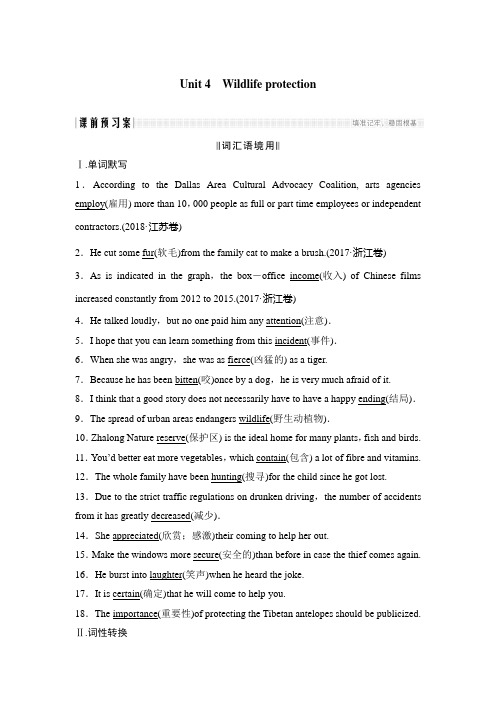
Unit 4Wildlife protectionⅠ.单词默写1.According to the Dallas Area Cultural Advocacy Coalition, arts agencies employ(雇用) more than 10,000 people as full or part time employees or independent contractors.(2018·江苏卷)2.He cut some fur(软毛)from the family cat to make a brush.(2017·浙江卷)3.As is indicated in the graph,the box-office income(收入) of Chinese films increased constantly from 2012 to 2015.(2017·浙江卷)4.He talked loudly,but no one paid him any attention(注意).5.I hope that you can learn something from this incident(事件).6.When she was angry,she was as fierce(凶猛的) as a tiger.7.Because he has been bitten(咬)once by a dog,he is very much afraid of it.8.I think that a good story does not necessarily have to have a happy ending(结局).9.The spread of urban areas endangers wildlife(野生动植物).10.Zhalong Nature reserve(保护区) is the ideal home for many plants,fish and birds. 11.You’d better eat more vegetables,which contain(包含) a lot of fibre and vitamins. 12.The whole family have been hunting(搜寻)for the child since he got lost. 13.Due to the strict traffic regulations on drunken driving,the number of accidents from it has greatly decreased(减少).14.She appreciated(欣赏;感激)their coming to help her out.15.Make the windows more secure(安全的)than before in case the thief comes again. 16.He burst into laughter(笑声)when he heard the joke.17.It is certain(确定)that he will come to help you.18.The importance(重要性)of protecting the Tibetan antelopes should be publicized. Ⅱ.词性转换1.The railway station is at a distance(distant) of two miles away from our school. 2.Mr.Lee decided to fight for the protection(protect) of the environment.3.Much to everyone’s relief(relieve),the airplane took off without any problems. 4.Eating too much every day is harmful to our health,that is to say,eating too much every day does harm to our health.(harm)5.None of the students responded to her question; that is to say,her question failed to get a response from any of the students.(respond)6.He succeeded his father as manager of the company.Soon their business became very successful.Lots of people wanted to know the secret of his success.(succeed) 7.He is such a merciful man as always has mercy on those homeless animals,which are usually at the mercy of the coldness and storm.(mercy)Ⅲ.短语填空1.According__to(根据)a new survey,51% of kids aged 10 to 18 go to bed at 10 pm or later on school nights.(2017·浙江卷)2.Are you in__danger__of(在……危险中)losing your job in the present financial crisis?3.This species has nearly died__out(灭亡)because its habitat is being destroyed. 4.People of different religions have lived together in__peace(和平地)for centuries in this country.5.We must pay__attention__to(注意)these problems and continue to take effective measures to solve them.6.I smiled in__relief(如释重负)as the last of the children hurried out of the door. 7.He saved up his money so__that(以至于)he could go to New Zealand for his summer holiday.8.When the sun is shining too brightly we should wear sunglasses to protect ourselves from(保护……不受……)the sun.1.句型公式:as引导的方式状语从句如果你按照我说的去做,你的梦想将很快实现。
- 1、下载文档前请自行甄别文档内容的完整性,平台不提供额外的编辑、内容补充、找答案等附加服务。
- 2、"仅部分预览"的文档,不可在线预览部分如存在完整性等问题,可反馈申请退款(可完整预览的文档不适用该条件!)。
- 3、如文档侵犯您的权益,请联系客服反馈,我们会尽快为您处理(人工客服工作时间:9:00-18:30)。
Learning about Language
Ⅰ.重点单词
1.powerful adj.强有力的,力量大的
2.hunt v t.打猎,狩猎
3.disappear v.消失
4.bite v t.& v i.叮;咬;刺痛
Ⅱ.核心短语
1.in space在太空
2.go down下降
3.run after追捕;追逐;追求
4.as usual像往常一样
5.pick out 挑选出,拣出;区别出;辨别出
Ⅲ.经典句式
After a while she saw some zebra with black and white lines going beneath their
stomachs.
过了一会儿她看到了一些斑马,它们身上有从上一直延伸到腹部的黑白相间的条
纹。
What should you do if you are being bitten by mosquitoes?(教材P29)
如果你正在被蚊子叮咬,你应该做什么?
bite vt.&vi.(bit,bitten)咬;叮;刺痛
bite+sb+介词+the+身体部位咬/叮某人的某部位
The dog bit the thief in the leg
那只狗咬了小偷的腿。
②Once bitten(bite),twice shy.
一朝被蛇咬,十年怕井绳。
(谚)
[名师点津]“咬某人的腿”表示为bite sb in the leg,即bite+人+介词(in/on)+
the+部位。
类似表达还有:打某人的脸hit sb in the face;拍某人的头/肩膀pat sb on
the head/shoulder。
现在进行时的被动语态
1.We are being killed for the wool beneath our stomachs.
2.Our fur is being used to make sweaters for people like you.
3.I wonder what is being done to help you.
4.So good things are being done here to save local wildlife.
一、构成
形式结构
肯定形式主语+be(am,is,are)+being+done
否定形式主语+be(am,is,are)+not+being+done
一般
be(am,is,are)+主语+being+done
疑问式
特殊
特殊疑问词+be(am,is,are)+主语+being+done
疑问式
1.表示此刻正在进行的被动动作。
She is being examined by a doctor.
她正在接受医生的检查。
2.表示现阶段正在进行的被动动作,但此动作在此时此刻不一定发生。
A new station is being built.
一个新的车站正在建设中。
3.表示经常性的被动行为,常与always,constantly 等词连用。
He is always being praised by the teacher.
他总是被老师表扬。
4.与部分情态动词连用,表示对正在发生的动作的推测。
He may be being scolded by his father at the very moment.
此刻他也许正被他父亲责骂。
三、注意事项
1.不及物动词(短语)、非延续性动词、表示存在意义/所属关系/静态特征的动词以及系动词不用于现在进行时的被动语态。
这本书是他的。
[误]The book is being belonged to him.
[正]The book belongs to him.
2.一些表示状态、心理活动、拥有、存在等的动词,如have,want,need,like,realize等,一般不用于进行时的被动语态,而常用一般现在时的被动语态表示此时此刻或目前主语正在承受谓语动词表示的动作。
玛丽,过来,有你的电话。
[误]Mary,come here.You're being wanted on the phone.
[正]Mary,come here.You're wanted on the phone.
3.“be+in/on/under等+名词”结构可表示现在进行时的被动语态的含义。
The bridge is under repair/construction(=is being repaired/constructed).
大桥正在建设中。
